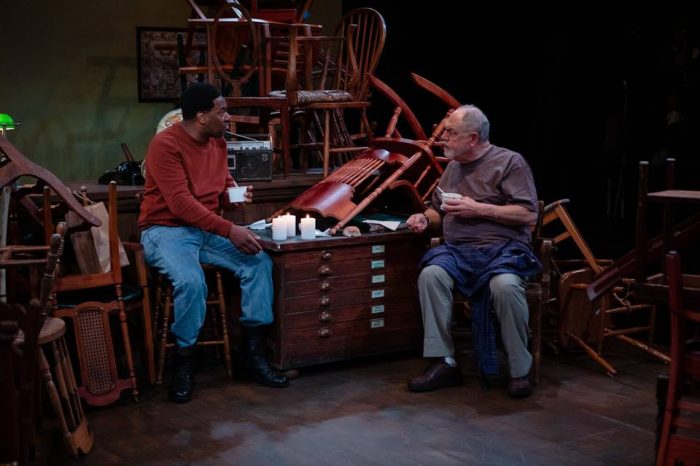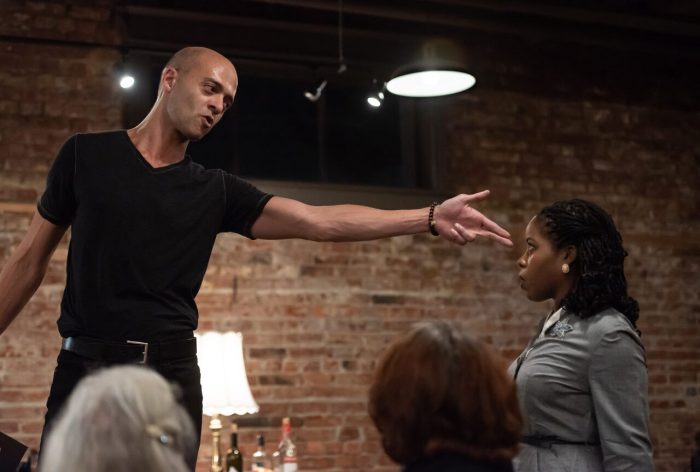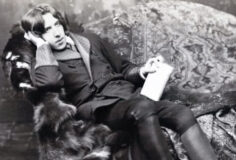We still don’t have a cure but we do have effective ways of treating HIV/AIDS in 2018 yet we still need to recognize that the HIV/AIDS Crisis isn’t over; people are still dying. And, we’ve probably lost sight of that and the devastation that plague has brought and continues to bring to the LGBTQ community.
Two local theater companies are staging works from the height of the AIDS epidemic. AJ Epstein and West of Lenin in Fremont is producing a revival of Seattle area playwright Steven Dietz’s 1993 drama, LONELY PLANET while The Williams Project is staging Tony Kushner’s 1986/87 play A BRIGHT ROOM CALLED DAY, which might be called an early draft, at least thematically, with his magnum opus, ANGELS IN AMERICA.

Reginald and Michael Winters in Steven Dietz’s LONELY PLANET at West of Lenin, Oct 26 to Nov 17, 2018. Photo: John Ulman
Up first: Lonely Planet returns to a Seattle stage after its 1993 area debut at ACT starring Laurence Ballard and Michael Winters as two late 30s/40something year old gay men coping with the onslaught of the AIDS Crisis in their lives. That production was directed by its author, Steven Dietz (who wrote this play for these two actors) and for this revival, Dietz returns to once again direct Mr. Winters and Reginald André Jackson, replacing Laurence Ballard, as the two men, Jody and Carl.
Jody owns a map shop and seems more than a bit agoraphobic; he’s happiest inside the shop and experiencing the outside world via the maps of the far away places he loves. Carl is the hyper energetic voluble friend who frequently pops into the store to kvetch with Jody. Lately, Carl has been acting a bit peculiar though….he’s started bringing in stray CHAIRS he claims to have found and wants to store them in the map show. Naturally, Jody objects but as the play progresses, the shop gradually fills with more and more chairs…which all seem to mean something to Carl, a seemingly rootless man who claims to have a rather improbable number of different jobs ranging from tabloid reporter to auto glass installer. Jody and Carl also like to regale one another with discussions about their vivid dreams…
If it all sounds a bit “dreamy” and symbolic, you’re quite safe in that assumption because Mr. Dietz’s play is just chock full of symbolism and imagery…I mean, just think about the significance of the setting (a map shop) belonging to an agoraphobe and all those EMPTY chairs that recall the play The Chairs by Ionesco (which the characters actually discuss in this play) and the use of dream imagery. Lonely Planet is largely populated by the symbolism of its characters and themes.
And, the cloud of AIDS hangs over both Jody and Carl, who are both gay but not very overt about it, though Carl wears a lavender bandanna in his back pocket, (which in hanky code means he’s a drag queen…which seems unlikely for this particular character. Or, is the hanky actually a magenta color indicating he’s REALLY into armpits?) As the play progresses, we learn that Jody is fearful of getting tested for HIV/AIDS…and, Carl finally explains the significance of the chairs and his random assortment of jobs and how THAT ties into the gay community and the blight of the AIDS epidemic.
I liked this play and this very professional production. Mr. Dietz does a fine job of directing and both Mr. Jackson and Mr. Winters are excellent in their roles, though truth be told, the Mr. Winters has aged out of his role…the script does seem to indicate that the two men are fairly close to each other in age. The fact that Mr. Winters now reads as being old enough to be the father of the other character does throw it off a bit. That said, both men give impeccable performances.
The production also features a very handsome and professional set design by Richard Lorig with equally strong lighting design by Rick Paulsen (who designed the lights for the 1993 ACT production as well) and Rob Witmer’s usually solid sound design. Despite being in a small theater space, this is a thoroughly professional production in every regard. It’s “Broadway” level theater in an off off Broadway sized venue and it’s a strong production very much worth checking out.
That said, I will say that this play does feel a bit dated at times, in style and theme…to be honest, I’m not sure why West of Lenin and Mr. Dietz wanted to revisit this work. It’s such a bittersweet recollection of a far gone time. But maybe playwrights and theater companies enjoy flipping through the pages of their old scrapbooks and drifting into a reverie about the past, the good parts and the sad….just like the rest of us. Lonely Planet is a moody, dreamy play and maybe it’s the kind of work that’s best served as a melancholy memory long after the time it portrays.
Maybe, it’s best to think of bitter times being in the past and far, far away.
Review: LONELY PLANET by Steven Dietz. Produced by AJ Epstein/West of Lenin. Directed by Steven Dietz. Scenic Design by Richard Lorig. Sound Design by Robertson Witmer. Lighting Design by Rick Paulsen. Costume Design by Constance Rinchiuso and Michael Notestine. With Michael Winters and Reginald André Jackson. Onstage at West of Lenin/Fremont from October 26 through November 18, 2018.

Brandon J. Simmons and Claudine Mboligkpelani Nako in The Williams Project’s production of Tony Kushner’s A BRIGHT ROOM CALLED DAY, being performed at the Hillman City Collaboratory from Oct 25th to Nov 18, 2018. Photo: Marcia Davis
An even earlier work that concerns, to a degree, the peak years of the AIDS Crisis in America, is Tony Kushner’s A BRIGHT ROOM CALLED DAY which had its first workshop staging in 1985 and premiered in San Francisco in 1987. In many ways, the play is a warm-up to the superior Angels in America, his Pulitzer Prize winning opus that dealt more directly with AIDS and the Reagan Administration’s failures to deal with the crisis while thousands died. “Bright Room”, like “Angels”, centers on a group of friends dealing with a crisis and features the appearance of ghostly and unworldly beings. But, while Angels in America directly deals with AIDS, A Bright Room Called Day uses the waning days of Germany’s Weimar Republic and the rise of the Nazis in the early 1930s as a stand-in for the rise of Ronald Reagan’s America.
And, Donald Trump’s….
But, Reagan is very much present in A Bright Room Called Day. While the play focuses on Agnes, a simple bourgeois, just entering middle age character actress in films and her arty circle of friends, most of whom are Communists or certainly lean in that direction, and opposed to the rise of the Fascist Nazis while disdaining the ineffectiveness of the middle of the road centrist Weimar Republic in power, there’s a second element in the play that represents a “modern” perspective representing the time this play was produced. As Agnes and her friends deal with Hitler, there’s also the contemporary character Zillah Katz, an American antifa who may or may not straddle the mid 1980s and right now (2018) as she stands on the sidelines with an overhead projector and commenting on the events of 1932 Berlin by comparing them to the to 1985 tactics of the Reagan Administration as well as sneaking in the very much similar assaults on democracy by the current Illegitimate Regime of Herr Trumpf.
Yes, it’s Kushner’s agitprop response to Reagan and that government’s failure to address the AIDS Crisis (as well as a general animosity to the Reagan Administration’s policies overall) and A Bright Room Called Day is obviously an overtly leftist political work. If you don’t swing to the Left to any degree, you’re not going to “enjoy” this play. Just stay home and think about your sins…
But, even if you DO swing to the left side of the political spectrum you might not enjoy this production much either. If you’ve come to the theater expecting to see a work as polished and grand as the two part Angels in America, you’re gonna be disappointed here. This is jejune Kushner at the start of his career, a very young playwright with great promise that is yet unfulfilled by the future of “Angels” (then a disappointing third act writing bland screenplays for Steven Spielberg…but I digress.) A Bright Room Called Day has scenes and dialogue of great power, but the characters are one dimensional and the play suffers from being overly didactic and ponderous. It’s also oddly paced and, for lack of a better word, it’s a clunky play as it lurches from one scene to the next with the awkward interruptions from the modern Zillah character plunked into the narrative and frequently overlapping with the main Berlin plot.
I think much of that “clunkiness” is inherent in the script but sadly, Ryan Guzzo Purcell’s strong skills as a director have failed him here. While I usually very much look forward to productions by his theater company, The Williams Project and enjoy them for his innovative staging of his talented ensemble of actors, here the problematic script and the awkwardness of the setting have overwhelmed him. And, yes, part of this production’s issues are rooted in the venue where it’s being staged…it’s the storefront non-profit space, the Hillman City Collaboratory and it does not lend itself to theater productions of this magnitude….the sight lines are terrible (there are pillars obstructing views) and the lack of a raked stage means it can be very difficult to actually see what’s going on…other than the back of the guy sitting in front of you’s head. The playing area is ill-defined and Zillah’s desk with the overhead projector is just plunked to the side of that playing area. The result is a night of poorly staged theater with the failure of the mechanics of placing the actors within a playable area contributing to that sense of “clunkiness”. This play should have great energy and flow and frankly Mr. Purcell’s direction hasn’t provided any of those things…he’s been overwhelmed by the turgid aspects of the script and the nebulous playing area.
As usual, The Williams Project has terrific actors involved in this project but while some are well cast, others are not. Not to be binary about it, but the men overall have the advantage over the women in this production though to be fair, two of the male roles are “showy” ones. Grant Chapman is excellent as Agnes’s overly gay friend Gregor who has an opportunity to end the “Hitler Problem” but fails to take it and Brandon J. Simmons plays dual roles, one an officious Communist party hack but the other one gives him an opportunity to stop the show, as the actual Devil summoned forth by another character to give a blistering monologue where he transforms from decrepit old man into a virile young man. It’s a mesmerizing bravura performance that is the chief highlight of play and this production.
Nick Edwards also enthralls as Husz, the bearish Hungarian and part time lover of Agnes (he is also the one to summon the Devil). And, for the women actors, Dedra Woods is bluntly captivating as the artistic Communist Gotchling who patiently explains to the rather slow witted Agnes, why it’s important to do what they do…and, to flee when they can, to fight another day. Meanwhile, Elise LeBreton’s Zillah never seems to be adequately integrated into the show; she just puts slides on a projector. And, poor Lexi Chipman isn’t really given much to do than play a sidekick.
But, two of the actors have serious problems with their roles, in my opinion, and it’s not due to their talent…they’re just not the right actors for their parts. Lateefah Holder as Agnes, is supposed to be the center character around which this story evolves but she’s not commanding in the role, which it must be said, is that of a weak, indecisive, middle of the road person who is frozen in inaction. But, Ms Holder seems a bit frozen from the get-go; there is no build up to her final fate. She never establishes any core sense of who she is and why this play centers on the character. (And, to be fair, the character’s obliqueness makes it a hard role to cast and a hard role to portray; Agnes is such a marshmallow…how do you play that?)
Meanwhile, the very talented Claudine Mboligikpelani Nako is playing two characters here but doesn’t really register in either. Her principal character is a vain, self-centered actress named Paulinka and while Paulinka is a starry role and Ms Nako is very starry indeed, she doesn’t capture the selfish nastiness of the character. She’s an actress who radiates “nice” and maybe “vapid egocentric bitch” is outside her wheelhouse. She also plays a mysterious character named “Die Alte” which means “The Old One” in German and…well, Ms Nako isn’t old and while the character is a ghostly one and used as a device to warn Agnes of the dangers that lie ahead, it never rings true. In the context of this production it’s actually confusing because lovely Ms Nako is at first onstage as the lovely but selfish Paulinka wearing pretty clothes then leaves the stage to return in five minutes wearing slightly different and more flow-y yet still lovely clothes (and a tiara) portraying this oddball character that we have no relationship with or any idea what that character is representing.
Good actors CAN be cast in the wrong roles.
Other than some of the performances and the IDEA of doing this particular play within the context of the awful times we currently live in, there’s isn’t much to recommend about The Williams Project’s production of A Bright Room Called Day. It’s a rare disappointment from a theater company I much admire.



















